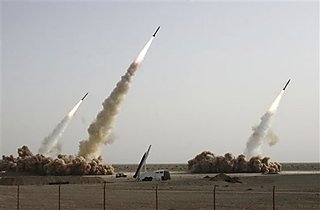
Almost a year ago, my colleague Steve Clemons wrote a controversial piece titled “Why Bush Won’t Attack Iran” citing the internal political and bureaucratic constraints that held at bay a deliberate attack on Iranian nuclear facilities (but not an “accidental” provocation and ramp-up of tensions). A recent discussion between Joe Klein and Jeffrey Goldberg triggered in my mind a half-formed, perhaps non-unique, but nevertheless worthwhile examination of the geopolitical constraints Iran faces despite its bluster.
My contention is this: even if Iran were to develop a nuclear capability, and even if Iran developed the sophisticated engineering for weaponization and delivery of a nuclear missile to launch it at Israel, and even if the US nuclear umbrella, let alone Israeli’s nuclear arsenal, was insufficient to deter a nuclear attack by Iran, the presence of 1.5 million Israeli Arabs (20% of Israel’s population) and 4 million Palestinians in such close proximity in an area the size of Massachusetts could pose quite the effective deterrent and hamstring Iran’s nuclear options.
Israeli Arabs are not neatly confined to certain sections of the country such that Iran could avoid them. Targetting population centers for maximum strategic effect means targetting significant numbers of Israeli Arabs as well, whose identities are arguably intertwined with Palestinians based on state treatment and kinship ties. An attack on Jerusalem for instance would easily kill countless thousands of Palestinians, wipe out significant Islamic holy sites, and without impeccable guidance systems (something Iran is hardly close to mastering) risk a direct hit on the West Bank. Even a densely populated target away from the Occupied Territories such as Tel Aviv is still home to over sixteen thousand Israeli Arabs. Multiple targets to deal a crippling blow to the country as some have suggested would require a similar blow to the Arab/Palestinian population.
Based on Iran’s past technical struggles, they face significant hurdles to achieve precision steering and guidance in their missiles to narrow in on their targets. Also Iran neither possesses nor is close to developing miniaturization capabilities (something I’m told by nuclear experts is a capacity only the US and Russia possess) to deploy tactical nuclear weapons and confine the blast radius. So in addition to the thousands of Palestinians who could be killed in the blast, the likely fallout could kill thousands more in the Occupied Territories and the radiation could quickly spread to the surrounding Arab states including Egypt, Lebanon, Syria if not farther.
Once the pictures surface on Al-Jazeera of innumerable, charred Palestinian bodies and Arabs slowly dying of radiation exposure because Iran launches a pre-emptive, all-out assault to hedge against Israeli retaliation, it would deal a costly geopolitical blow to Iran and compound its own national security threats. Attacking one of the most critical regional actors and symbolic victims of the 60 year Arab-Israeli conflict would invite devastation to Iran’s shores. Certainly the death of Israelis would be tragic but the killing of Palestinians would have particular resonance that could stoke an uncontrollable fury amongst regional actors.
Overnight, Iran would double its enemies by opening itself as a target to all Arab states affected by the attack. Regional salafist terrorist networks like al Qaeda would pounce on an opportunity to turn their sights on Iran, as many see infidel Muslims (takfir) as even worse than foreign occupiers. And even Iranian backed groups like Hezbollah and Hamas could not afford to hold public sympathy for such deliberate acts of “collateral damage”.
Unless the Iranian government was able to sell this on the basis of an existential threat (which is possible but difficult given Iranians’ connections to the outside world and access to global information), the government could also face a severe domestic political backlash.
A leading scholar of grand strategy Edward Luttwak suggested in a talk last spring that Iran’s strategy in the region has long been to rise by playing down its sectarian distinctions as a Shiite state and by assuming the staunchest position on the cause celebre of the region — the Palestinians. If there is any singular act Iran could commit to squander this capital and move quickly into the category of public enemy number one in the region, it would be to launch a nuclear attack that killed on the Palestinians.
— Sameer Lalwani


23 comments on “Why Iran Can’t Bomb Israel”